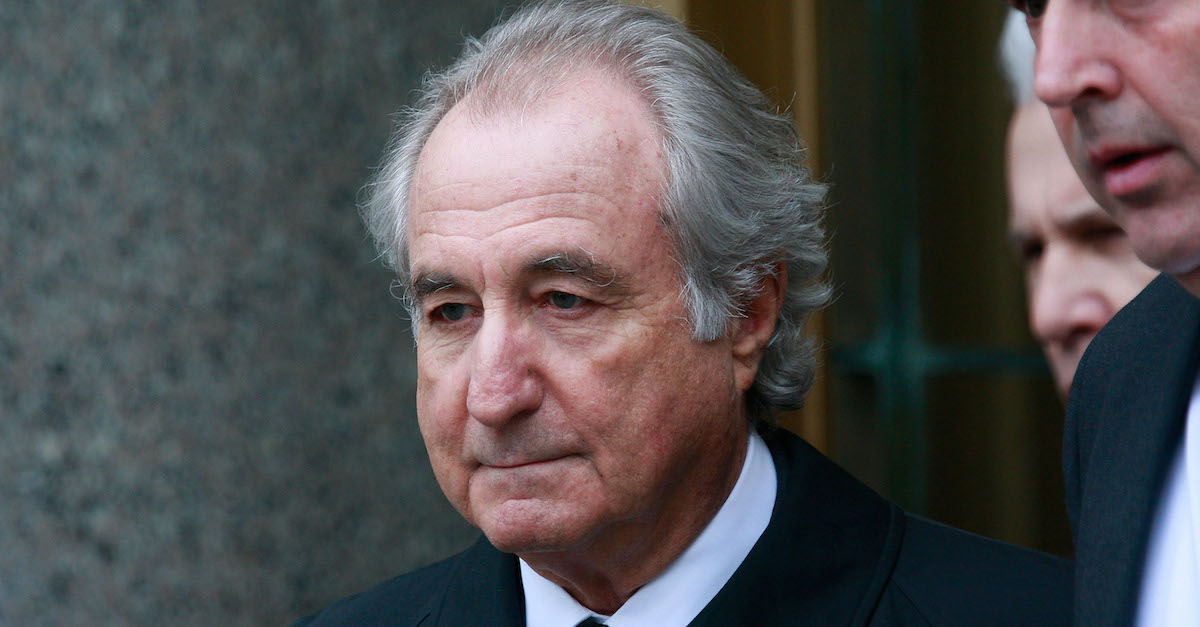
Ponzi scheme architect Bernie Madoff has died at the age of 82 in federal prison.
NEW YORK (AP) — AP source: Ponzi schemer Bernie Madoff has died in a federal prison, believed to be from natural causes.
— Zeke Miller (@ZekeJMiller) April 14, 2021
The government, whether the prosecution or the sentencing judge, were both clear that they thought Madoff should die in prison for his “extraordinarily evil” crimes. Madoff died on Wednesday at the Federal Medical Center in North Carolina.
Madoff previously filed a clemency petition in 2019 asking then-President Donald Trump to commute his 150-year prison sentence. Madoff, the confessed operator of the largest Ponzi scheme ever recorded and the most expensive financial fraud in the history of the United States, sought a reduced sentence rather than a pardon for his crimes.
Madoff pleaded guilty to 11 felony charges in 2009 and was sentenced to a 150-year prison term, the maximum allowable sentence for his crimes.
Marc Litt, the lead federal prosecutor on the case against Madoff, responded to news of Madoff’s requested clemency by saying it was the “very definition of chutzpah.” The clemency never came.
As recently as March 2020, federal prosecutors argued against Madoff’s compassionate release from prison. Madoff’s lawyers said their client had terminal kidney failure and less than 18 months to live. That proved to be accurate.
But prosecutors maintained that Madoff was no run-of-the-mill white collar criminal.
“Madoff, unlike other serious white-collar fraudsters, received a sentence he could not possibly outlive because his crime was exponentially more serious than even the most serious other offenses,” the prosecutors argued. “Madoff’s crimes were ‘extraordinarily evil.’ His sentence was appropriately long. It should not be reduced.”
The government also cited some 500 letters from Madoff’s victims arguing against the compassionate release request—only 20 of Madoff’s victims favored such leniency.
“Why should he be shown any compassion, when he had none for his many victims?” one of Madoff’s victims asked rhetorically.
The Ponzi scheme concocted by Madoff is believed to the largest and most harmful in U.S. history. It began sometime in the 1980s and ran for over two decades as investors handed over billions in cash that was actually never invested at all. Near the end, Madoff had only retained a few hundred thousand dollars—all the while living in luxury and setting the Wall Street example of the man about the market.
While Madoff’s attorneys argued their client was “remorseful” for his actions, the government said that he didn’t understand the gravity of his crimes.
“Since his sentencing, Madoff has demonstrated a wholesale lack of understanding of the seriousness of his crimes and a lack of compassion for his victims, underscoring that he is undeserving of compassionate release,” the prosecutors added.
As for Judge Denny Chin? He made clear that when he was a U.S. District judge and sentenced Madoff in 2009 t0 150 years in prison, he did so intending that Madoff would remain behind bars for the rest of his days.
“When I sentenced Mr. Madoff in 2009, it was fully my intent that he live out the rest of his life in prison,” now-Circuit Judge Chin wrote in June 2020 for the U.S. Court of Appeals for the Second Circuit, denying Madoff compassionate release. “His lawyers asked then for a sentence of 12 to 15 to 20 years, specifically with the hope that Mr. Madoff would live to see ‘the light of day.’ I was not persuaded; I did not believe that Mr. Madoff was deserving of that hope. Nothing has happened in the 11 years since to change my thinking.”
Chin called Madoff’s fraud upon the world “extraordinarily evil.”
Colin Kalmbacher contributed to this report.
[Image via Mario Tama/Getty Images]
Have a tip we should know? [email protected]